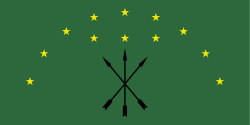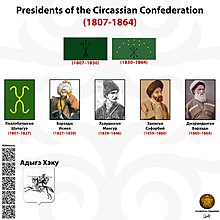| The Circassian Parliament Шъхьафитныгъэ Хасэ Şhafitnığə Xasə | |
|---|---|
| Parliament of Circassia | |
 The Circassian flag variant used by the Parliament The Circassian flag variant used by the Parliament | |
 Administrative divisions of Circassia according to the decree issued by the Parliament Administrative divisions of Circassia according to the decree issued by the Parliament | |
| Type | |
| Type | Unicameral |
| History | |
| Founded | 13 June 1861 (163 years ago) (1861-06-13) |
| Disbanded | 21 May 1864 (160 years ago) (1864-05-21) |
| Preceded by | Lepq Zefes (People's Council) |
| Leadership | |
| Chairman | Qerandiqo Berzeg |
| Abdzakh Representative | Hasan Bish |
| Shapsug Representative | Islam Thaushe |
| Other important members | Qarabatir Zanuqo (son of Sefer Bey Zanuqo) Ismail Braqiy Ibrahim Thaushe Muhammad Khusht |
| Structure | |
| Political groups | Government |
| Elections | |
| First election | 13 June 1861 |
| Last election | 13 June 1861 |
| Motto | |
| Псэм ипэ напэ Psəm yipə napə "Honor before life" | |
| Meeting place | |
| Ş̂açə (Modern-day Sochi) (1861-1862) | |
| Mutıxwa (Modern-day Plastunki) (1862-1864) | |
| Qbaada (Modern-day Krasnaya Polyana) (1864) | |
| Part of a series on the |
| Circassians Адыгэхэр |
|---|
 List of notable Circassians Circassian genocide |
| Circassian diaspora |
| Circassian tribes |
|
Surviving Destroyed or barely existing |
| Religion |
|
Religion in Circassia |
| Languages and dialects |
|
| History |
Show
|
| Culture |

The Circassian Parliament or the Circassian Majlis (Adyghe: Адыгэ Хасэ, romanized: Adıgə Xasə; also called the Parliament of Independence; Adyghe: Шъхьафитныгъэ Хасэ, romanized: Şhafitnığə Xasə) was the legislature of Circassia officialized in 1861 after a meeting in Sochi attended by leaders of several Circassian provinces. A tribal confederation had existed before the parliament's establishment, but a centralized government was achieved only after it was built.
The parliament aimed to defend the western part of Circassia from Russian invasion, and to liberate the occupied Eastern Circassia from the Russian Empire during the Russian-Circassian War. It also sent delegates abroad to gain support for the Circassian struggle internationally.
History
Previous parliament
The first western-type parliament in Circassia was called in 1820 with 300 people. Important names such as Kizbech Tughuzhuqo were present in the assembly.
1861 parliament
Being a political resistance council and the legislature of Circassia, the parliament was established in the capital city of Sochi (Adyghe: Шъачэ, romanized: Ş̂açə) on June 13, 1861 and Qerandiqo Berzeg was elected as the head of the parliament and the nation. Although the Shapsug, Natukhaj, and Ubykh were the main founders, representatives from the Hatuqwai, Abdzakh, Bzhedug, Kabardian and Chemguy regions were also present. Abkhazians and Abazins were also represented in the parliament. Nobles, elders and commanders of all social backgrounds gathered to discuss the immediate need to collaborate and work together regardless of their ideological, ethnic, religious or social divisions for the sake of survival. In an effort to raise awareness, the council formally drafted and declared the independent state of Circassia to the world and immediately sought to have the Circassian nation recognized, as well as redouble efforts to secure arms and material support to finance their self-defense campaigns. They discussed tactics, planned alliances and made efforts to prepare for a last stand (see Qbaada last stand).
The first decisions
The decisions taken by the parliament were the following:
- The "Independent State of Circassia" is an independent state, as proclaimed once again on this day.
- The established parliament represents all Circassians regardless of tribe.
- Unity will be enforced by force if necessary.
- The initial parliament consists of 15 members.
- The country will be divided into 12 regions, each of which will be appointed administrators responsible for administrative, legal and security, these administrators will act on behalf of the assembly.
- Regional administrators will collect taxes on behalf of the council, the cost of 5 cavalry per 100 households will be charged, and every 100 families will send 5 cavalry to the army. The collected taxes will be spent in the most beneficial way for the country's affairs in the name of the independence of Circassia.
- A government building and guesthouses will be built on behalf of the state administration.
- A justice system will be established immediately to enforce the law.
- Abkhazian, Abazin people will be accepted as legitimate equal citizens of Circassia along with Circassians.
- Proper contact with the Circassian and Muslim communities in Constantinople and London will be established.
- Under no circumstances shall Circassia surrender to Russia. Agreements will be made with Russia on equal terms through negotiations; if this is not possible, the war will continue.
Negotiations with Russia
The parliament government negotiated with the Russian Tsar Alexander II in September 1861 to establish peace, expressing their readiness to accept Russian citizenship.
These lands are ours, and we want to rule them with absolute justice. We strive to administer our country fairly, therefore we treat our people fairly and respect the lives and property of those who visit us. What is the objective of a powerful nation like yours: to destroy a people like us? Be fair to us and do not destroy our property or mosques; it is disgraceful for a powerful state to take lives unjustly. You are deceiving the entire world by circulating myths about us being a savage people; nonetheless, we are human, just like you. Do not strive to spill our blood; instead, allow us to exist here.
— Circassian leader Qerandiqo Berzeg's proposal to Tsar Alexander II of Russia

However, the annexation of Circassia was not enough for the Russian government, as Tsarist government sought to evict the Circassians from the ethnic territory. The Tsar consistently continued the policy of his father, Nicholas I, and rejected the Circassian peace proposals.
After being convinced by his generals, the Russian Tsar declared that Circassia will not only be annexed to Russia unconditionally, but the Circassians will leave, and if the Circassian people do not accept forcefully migrating to Turkey, the Russian generals will see no problem in killing all Circassians. He gave the Circassian representatives a month to decide.
Delegations to major powers
The parliament did not accept leaving their lands and sent delegations to the Ottoman Empire and the United Kingdom to gain support from both countries, arguing that they are being massacred and they would be forced into exile soon.
Ottoman and British delegations both promised recognition of an independent Circassia, as well as possible recognition from Paris, if they unified into a coherent state.
In Turkey, a special committee on Circassian affairs was created, and received donations from the local Muslim folk, and allegedly even from the sultan himself, secretly. However, the economically and politically weakened Ottoman Empire could not contribute further in protecting the Circassians.
Before any result was achieved, in 1862, as a result of the fall of Sochi, the parliament was dissolved and almost all of its leaders eliminated, and the resistance moved to the Caucasus mountains, new parliament meetings started to be held in Mutikhwa (Мутыхуа, now in the village of "Plastunki"), the last meeting was held in Qbaada before the parliament took its last decision, which was to not surrender, and the Battle of Qbaada was fought. The area fell, all insurgents were massacred by the Russian army, which announced its victory on 21 May 1864.
See also
References
- ^ 2. Российский государственный военно-исторический архив (далее – РГВИА). Ф. 38. Оп. 7. Д. 422.
- ^ "А.Д. Панеш: "Меджлис вольности черкесской" »". natpressru.info. Retrieved 2021-04-25.
- ^ Grassi, Fabio L. A new homeland: The Massacre of The Circassians, Their Exodus To The Ottoman Empire and Their Place In Modern Turkey. Aydin University International. ISBN 9781642261349.
- Владимировна, Чунтыжева Рима (2014). "Сочинский меджлис: опыт общественно-политического творчества адыгов в XIX веке". Вестник Майкопского государственного технологического университета (4): 15–19. ISSN 2078-1024.
- Трагические последствия Кавказской войны для адыгов (вторая половина XIX – начало XX в.). – Нальчик., 2000.
- ^ Ruslan, Yemij (August 2011). Soçi Meclisi ve Çar II. Aleksandr ile Buluşma.
- "UNPO: Circassia". Archived from the original on 2010-11-29. Retrieved 2010-10-22. Via UNPO
- English RUVR - Archived 2012-03-18 at the Wayback Machine via the Voice of Russia
- ^ Фадеев А.В. Указ. соч.
- Фадеев А.В. Убыхи в освободительном движении на Западном Кавказе //Исторический сборник. – М.; Л., 1935. – № 4.
- ^ Блиев М.М., Дегоев В.В. Кавказская война. – М., 1994.
- CYO, The Circassian Khasa
- Natho Kadir, Kafkasya`da ve Kafkasya Dışındaki Çerkesler, Ankara 2009
- Berzeg Nihat, Çerkesler, Chiviyazıları, 2006
- Nıbe Anzor, Adıge Maq,12 Eylül 2011,Çev: Hapi Cevdet Yıldız.
- Kasumov and Kasumov. Genotsid Adygov. Page 140
- Esadze. Pokorenie. Page 352
- Richmond, Walter. Circassian Genocide. Page 72
- Anzor, Nıbe. Çerkes Meclisi'nin 150. Kuruluşu.
Further reading
- Richmond, Walter. The Circassian Genocide, Rutgers University Press, 2013. ISBN 9780813560694